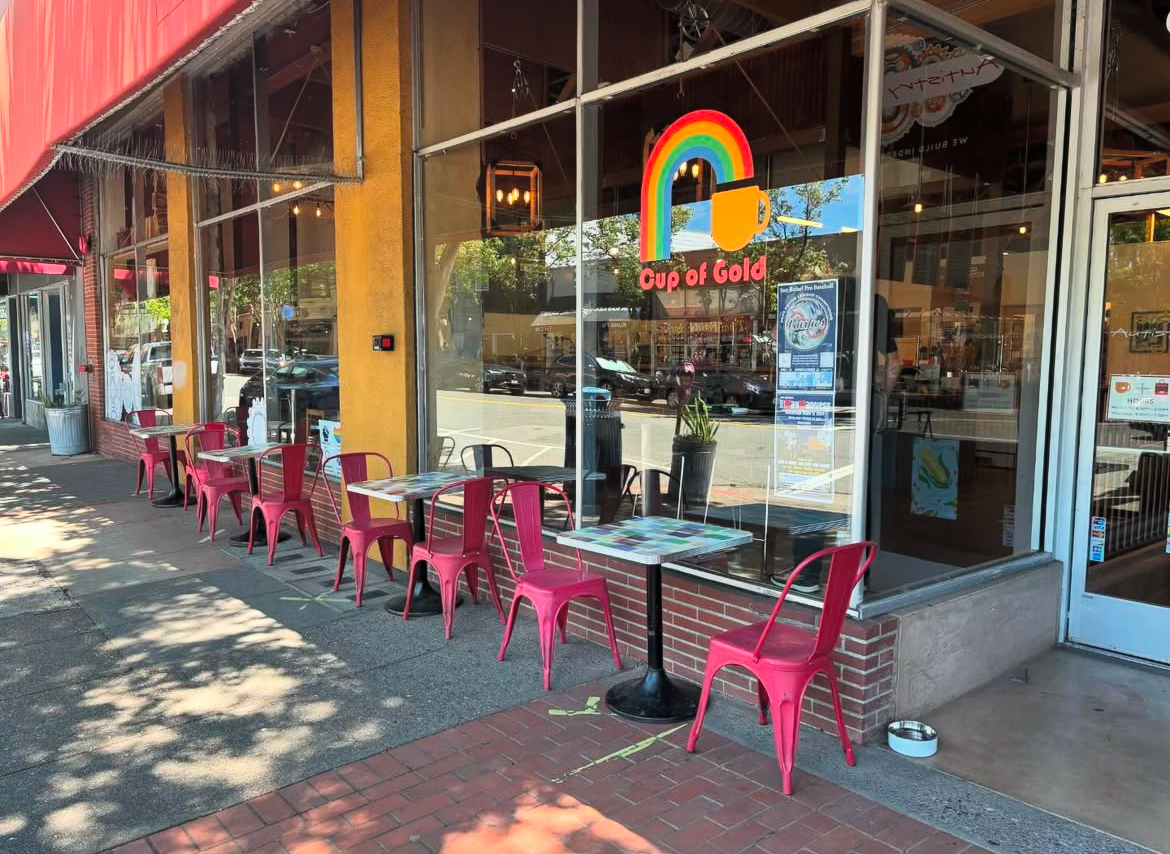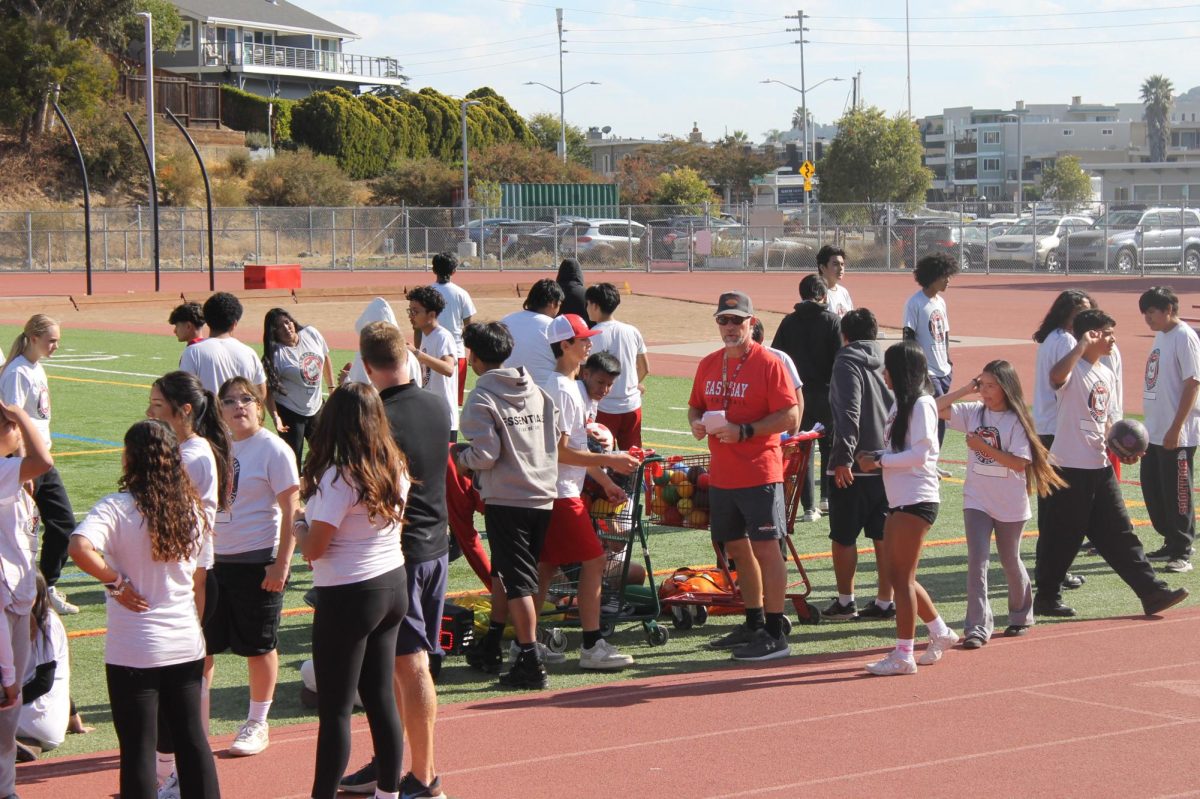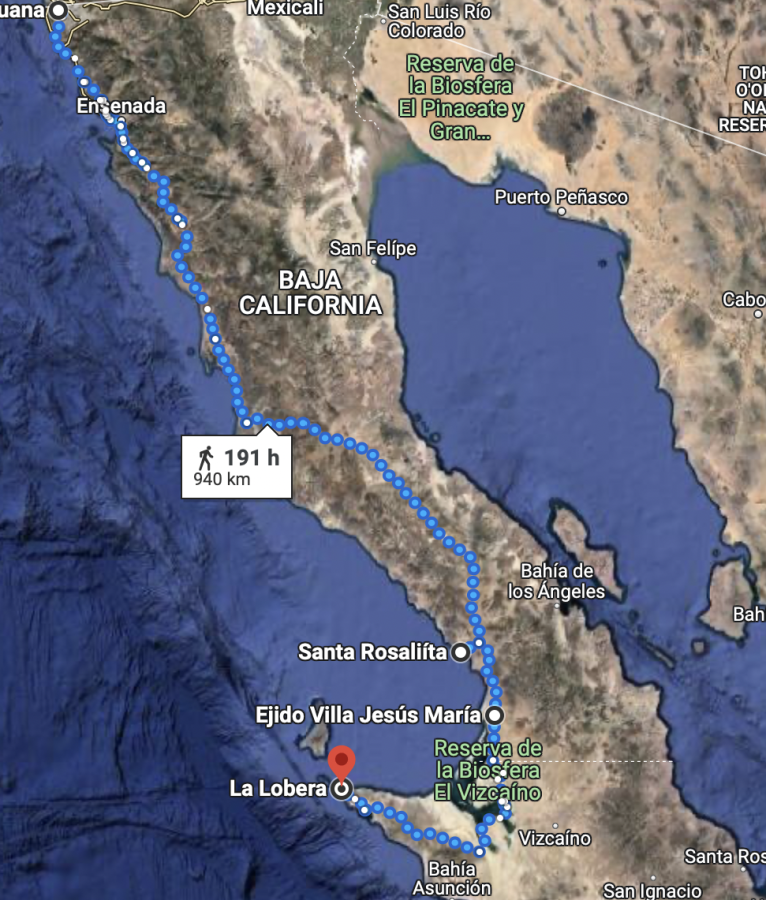Path to the Desert’s Edge
March 17, 2022
I stood on the sidewalk on the outskirts of town. Rays of daylight were barely showing up across the early morning sky. I watched two stringy brown dogs, almost identical in thinness and shape. Their bodies were speckled and shiny with hairless patches.
I was waiting for a shuttle that would take me far away from home. Overwhelmed by last-minute preparations, I had scribbled the route number of the bus and street it frequented on the back of a cardboard pack of gum.
Now, standing on the corner beside a plywood meat stall, watching a young man snip the heads off chickens, the bus seemed like a magic carpet. It carried the key to unlocking a secret journey, a dream that had made me walk hundreds of miles all the way from my home city in Tijuana to Guerrero Negro.
But getting on that bus seemed suddenly more daunting than anything I might have to face in the days to come.
Long ago, I used to fall asleep to stories my father used to tell me about racing his off-road motorcycle all through the Baja desert. I used to climb under my blankets, and beg him to tell me once again about the time he crashed into a nopal. I used to curl my nose in disbelief when he reenacted taking the long needles out of his knuckles. The times he saw coyotes, hares and roadrunners hiding in the bushes. How he often wandered down the desert trail, looking up to the beautiful constellations forming on top of him.
My father stopped racing after he fell off and got run over by his own motorcycle. With a third child on the way. My mom didn’t allow him to return to his glory days. But, through his glare, it was clear that he missed it.
After telling the story, he would dare me to go out into the wild and see if I had what was needed.
Seventeen years later, I took up his challenge and decided to walk all through his racing route. From the Northern Ensenada all the way down the long Baja arm. About 1200 miles of beautiful arid desert.
“It can’t be that difficult,” I thought to myself.
Yet, every time I sat down to talk about the trip, I heard a different story.
“It’s the most beautiful place I’ve ever seen,” one old family friend told me with a big grin. “The contrast between the desert and the sea. You don’t see that anywhere else…”
“Thieving, sneaky, dirty cops,” another growled, his face still rigid with anger from past encounters. “They’ll take every cent you have and leave you out there, in the middle of nowhere, to die.”
Everyone agreed, however, on what would happen if I tackled the desert walking on my own.
“You’ll die of insolation,” promised a rugged, six-foot-two mechanic, an ex-racer. He jerked at a tire with his crowbar. “There is no set path, the sun will scorch through your skin, the nights are horribly cold. You’ll disappear and no one’ll ever find you.”
“It’s not a long trip,” I said, “there is nothing dangerous about it.”
He stopped abruptly and leveled his crowbar at me. For the first time there was real frustration in his voice. “How the F*** do YOU know?”
He was right. What did I know? I only had my father’s stories, and a gut instinct telling me that everything was going to be fine.
I was ready to put my dignity, and by the man’s account, my life on the dreams my father passed down to me.
And so, one short week later, I made sure nothing was missing from my equipment, tucked my last bits of clothing into my backpack, and climbed aboard the bus.
In all honesty, I was frightened. I lay and slept on my brother’s shoulder through the whole bus ride, until it eventually came to a stop at the Ensenada terminal.
Our stomachs roared, we hadn’t eaten anything since the day before. We sat down on the first food stall we found.
“I’ve never heard of anybody that wanted to cross the desert walking,” said Francisco, a middle-aged man who split his day being a fisherman at dawn and a taquero in the evening. “Not much happens though,” he told me in his deep voice. “There is little between here and Playa Altamira, a couple of cheap hotels and gas stations if you walk near the freeway.”
After paying the bill and thanking him for the meal we decided to walk around the city.
We made it to a small ship deck. The water lapsed and the sea foam whirled wildly at my feet before retreating back into the endless expanse. Seagulls shouted back at the roaring waves and people mingled in the background. The sun shone through the swelling clouds, painting the darkening sky into all shades of gold and yellow.
We decided to camp out on the beach that night, it was warm and calm. A great start for the trip, we thought.
The next morning dawn was gray and dull. We tucked our sleeping bags in their sacks and wandered southward, asking for directions as we cruised down the main street.
Eventually the path took us to the desert’s edge. I could see never ending mountains of sand, cacti growing thickly, the whistling of wind piping through the worn out rocks. The dry dusty air made it hard to breathe.
We had finally made it to the middle of nowhere.
As we started our way across the winding dunes of sand, the sky was clear. We found joy watching tumbleweed roll past us, watching dust devils swirl across the canyons, listening to vultures and eagles cawing as they soared through the sky.
By early afternoon we were blistered toed and pack-sore. I spotted what I would call a small village in the distance. We walked towards it, hoping to find a warm bed, or at least a refuge to spend the night.
The air was dark and heavy with coal-fire grime. The streets were deserted but for a few old vendors crouched next to their fire pits, stroking around the embers before laying on top maize to roast. Every doorstep or alleyway sheltered a body or two.
Through the unwelcoming stares we realized we were an unwanted presence. As we sped out of the small streets, dark had slowly creeped on us. Once more, we had no choice but to sleep outdoors. My brother and I nestled together to ward off the late afternoon chill.
The pale crescent moon shone like a smile in the night sky; we looked up at the blanket of stars that stretched to infinity. The world came to a stop. It felt like the curtain was pulled back, we got a chance to see out of the window we call “the sky” into the universe beyond. I, maybe for the first time, understood my father.
We continuously repeated the process of walking many miles, and sleeping amongst the snakes and lizards.
One morning I was woken up by the sound of a hassling voice. A stringy young man in a military uniform was speaking to my brother. I looked around silently to find out that we were sleeping on military ground. The young soldier was interrogating my brother in English. They confused his white skin with one of an American tourist, and with the sound of dollars.
“No sir, you are in biiiig trouble,” said the young sergeant. “But, we can fix this easily, it’ll just cost you a little green gold,” he continued.
“I speak Spanish, dumbass,” said my brother, in Spanish.
All of the officers clicked their tongues, and swung their bodies back, unbelievably annoyed. They didn’t waste any more time. In less than a few minutes we were brought to a small office.
We were made to wait there until the Captain had time to speak to us.
“It’s lunchtime,” the soldier that worked as a doorman snapped. “It’ll take some time to settle your case.”
We strolled around the office, trying to make sense of maps filled with incomprehensible code, large pictures of old Mexican generals, and presidents. We read through old social ethics books filled with grime and dust just to entertain ourselves in those long hours.
“Captain Hernandez is not here,” the doorman said as he settled papers, preparing to go home. “He’ll be here tomorrow.”
A busy man, we remarked, no doubt essential to the smooth operation of the office.
“Where are we going to sleep?” we asked.
“Follow me,” said the soldier with a smile.
They had set a small tent next to the latrines for us to sleep in.
The next morning we were there when the office opened, hoping to finally meet Captain Hernandez. He didn’t seem overjoyed to see us. He led us into his office and immediately claimed our IDs. He wasn’t happy when he found out that I was barely 16 years old. He snapped the cards into his desk and rearranged his face into the universal expression of all third-world government officials: half-lidded eyes, lips compressed and sagging at the end.
“When are you going home?” he inquired, after a series of multiple questions.
“As soon as we can,” my brother replied.
With that, we were escorted out of the military camp.
A fresh breeze delighted our bodies, a new smell captivated our noses. We knew we were close to reaching our end goal. We had walked until we found ourselves surrounded by fresh, green palm trees that completely defied the reality we had lived in for many weeks.
At last, we could hear the crushing of bubbles underneath waves. A taste of the salty air made me rejoice, my body forgot about the fatigue it had carried around for countless miles.
My brother and I contemplated expanding our trip even further; there was nowhere to go but everywhere.
But, a sudden growl coming from our insides reminded us of the difficulties the trip had brought upon us. Watching the sun hide behind the dense sea, we decided to celebrate the end of our trip sleeping under the stars one last time.
The next morning we packed. It was time to go home.






































